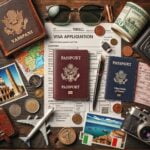Are you planning a trip to Italy? Whether it’s for vacation, study, work, or any other purpose, knowing what forms are needed to travel to Italy is crucial for a smooth and successful trip.
Failing to have the necessary documentation can result in delays, denial of entry, or even deportation. In this article, we will provide detailed information on the various forms and documents required for traveling to Italy, including visa requirements, passport guidelines, Schengen visa application form, travel authorization forms, health and insurance forms, customs declaration form, and additional documents for specific types of travelers.
When traveling to Italy, the first thing you need to consider is the type of visa required for your trip. Whether it’s a tourist visa, student visa, work visa or any other category of visa, understanding the specific requirements and filling out the necessary forms accurately is essential to avoid any complications during your travels. Additionally, ensuring your passport meets all requirements such as validity period and blank pages is equally important in order to gain entry into Italy.
For travelers with special circumstances such as minors traveling alone or those with specific health or insurance requirements, additional travel authorization forms and health declaration forms may be necessary. Furthermore, it’s crucial to be aware of the customs declaration form which outlines the items that need to be declared upon entering Italy and any duty-free allowances or restrictions on imports.
By gathering the correct forms and documents needed for your trip to Italy in advance and ensuring they are filled out accurately and completely can help you avoid unnecessary hassles at immigration checkpoints. In this article we will provide a comprehensive guide on each type of form or document required for different types of travelers so you can enjoy a stress-free journey.
Visa Requirements
Italy is a popular tourist destination, attracting millions of visitors each year. However, traveling to Italy requires the right documentation, including visas for certain travelers. Understanding what forms are needed to travel to Italy is crucial in ensuring a smooth and hassle-free trip. This section will provide detailed information on the visa requirements for traveling to Italy, including tourist visas, student visas, and work visas.
Tourist visas are required for individuals planning to visit Italy for leisure, sightseeing, or visiting family and friends. These visas allow travelers to stay in Italy for a short period and must be obtained before entering the country. Student visas are necessary for those who intend to study in Italy for an extended period, while work visas are required for individuals seeking employment opportunities in the country.
It is essential that travelers check the specific visa requirements based on their nationality and the purpose of their visit. Some travelers may be exempt from obtaining a visa based on bilateral agreements or if they hold certain types of residency permits from other Schengen countries.
Understanding the different types of visas required when traveling to Italy is vital in ensuring that all necessary forms are completed accurately and submitted on time. Travelers should also be aware of any additional supporting documents required as part of their visa application process and any specific conditions associated with each type of visa.
| Visa Type | Details |
|---|---|
| Tourist Visa | Short-term stay for leisure or visiting family/friends |
| Student Visa | For those intending to study in Italy |
| Work Visa | For individuals seeking employment opportunities in Italy |
Passport Requirements
When traveling to Italy, it is essential to ensure that your passport meets the specific requirements set by the Italian government. Firstly, all travelers must possess a passport valid for at least three months beyond their planned departure from Italy. This requirement applies to all visitors, regardless of their nationality. Additionally, it is crucial to check if your passport has enough blank pages for entry and exit stamps, as well as any necessary visas or permits.
For citizens of some countries, there may be additional documents needed when traveling to Italy. For example, non-EU travelers might need to provide proof of sufficient funds for their stay in Italy and a return ticket to their home country. Moreover, those who require a visa should ensure that they have a valid visa stamp in their passport before embarking on their journey.
It is essential to verify the specific passport requirements based on your nationality and travel circumstances before departing for Italy. Failure to comply with these requirements could result in denial of entry into the country and serious inconvenience during your trip. Therefore, taking the time to understand what forms are needed to travel to Italy can save you from unnecessary hassles and setbacks during your visit.
| Passport Requirements | Description |
|---|---|
| Validity Period | At least three months beyond planned departure date |
| Blank Pages | Enough pages for entry/exit stamps, visas, or permits |
Schengen Visa Application Form
Traveling to Italy requires the correct documentation, including a Schengen visa for many travelers. The Schengen visa is essential for non-EU citizens planning to visit Italy for tourism, business, or other purposes. Filling out and submitting the Schengen visa application form can be a daunting task, but with the right guidance, it can be a smooth process.
To apply for a Schengen visa to travel to Italy, here is a step-by-step guide on how to fill out and submit the Schengen visa application form:
1. Obtain the application form: The first step is to download the Schengen visa application form from the website of the Italian consulate or embassy in your home country.
2. Fill out the application: Carefully complete all sections of the application form, providing accurate and truthful information about your personal details, travel plans, and purpose of visit.
3. Gather necessary documents: Along with the completed application form, you will need to provide supporting documents such as proof of accommodation, travel itinerary, bank statements, and a letter of invitation (if applicable).
4. Provide photos: Include two recent passport-sized photos that meet the specific requirements outlined by the embassy or consulate where you are applying.
5. Pay the visa fee: Depending on your nationality and type of visa, there may be a fee for processing your Schengen visa application. Be sure to pay this fee before submitting your application.
It’s important not only to know what forms are needed to travel to Italy but also how to properly complete them in order to avoid any delays or issues with your visa application process. By following these steps and ensuring all necessary supporting documents are provided, travelers can increase their chances of obtaining a Schengen visa for their trip to Italy.
Travel Authorization Forms
When traveling to Italy, it is essential to have the necessary travel authorization forms in order to ensure a smooth and hassle-free trip. This is especially important for minors traveling to Italy, as well as solo travelers and those with special circumstances. It’s important to know what forms are needed to travel to Italy in order to avoid any potential consequences or delays at the border.
For minors traveling to Italy, parental consent forms are often required. These forms typically require notarized consent from both parents or legal guardians, granting permission for the minor to travel internationally. In addition to parental consent forms, solo travelers and those with special circumstances may be required to provide additional documentation. This could include proof of financial means, a detailed itinerary, or even a letter of invitation if visiting friends or family.
In addition to the specific travel authorization forms, all travelers entering Italy will need to complete a customs declaration form. This form requires travelers to declare any items being brought into the country, including currency over a certain threshold, valuable goods, and certain types of food or plants. It’s important for travelers to familiarize themselves with the customs regulations in order to avoid any issues upon arrival.
To ensure that travelers have all necessary forms and documents before heading to Italy, it’s advisable for them to make use of a comprehensive checklist. Here is an example of an organized checklist:
- Valid passport with at least six months validity
- Completed Schengen visa application form
- Parental consent form for minors
- Notarized letter of invitation (if applicable)
- Proof of financial means
- Health declaration form
- Completed customs declaration form
By having all necessary forms and documents ready before traveling, visitors can enjoy their time in Italy without any unnecessary stress or complications.
Health and Insurance Forms
When traveling to Italy, it is essential to ensure that all necessary health and insurance forms are complete and up to date. This section will provide detailed information on the specific forms required, as well as any health requirements for travelers visiting Italy.
Health Declaration Forms
Before traveling to Italy, it is important to be aware of any health declaration forms that may be required. Some countries have specific health requirements for incoming travelers, such as mandatory vaccinations or medical certifications. It is advisable to check with the Italian embassy or consulate in your country to determine if any health declaration forms are needed before your trip.
Insurance Forms
Travelers should also have adequate travel insurance coverage when visiting Italy. While it may not be a specific form, having proof of travel insurance coverage is essential. Travel insurance can provide protection in case of unforeseen events such as medical emergencies, trip cancellations, or lost luggage. It is recommended to obtain comprehensive travel insurance that includes coverage for medical expenses and emergency evacuation while in Italy.
Specific Health Requirements
In addition to health declaration forms and insurance, travelers should be aware of any specific health requirements for visiting Italy. Depending on the traveler’s country of origin or recent travel history, there may be certain health precautions or vaccinations recommended or required for entry into Italy.
It is advisable to consult with a healthcare professional or visit a travel clinic well in advance of your trip to ensure that you are up-to-date with any necessary vaccinations or medications for travel to Italy.
By ensuring that all necessary health and insurance forms are completed and understanding any specific health requirements for travel to Italy, visitors can enjoy a safe and worry-free trip. It is crucial to take these steps seriously in order to avoid any potential disruptions during your time in Italy due to lack of documentation or preparation regarding your health and insurance needs.
Customs Declaration Form
When entering Italy, travelers are required to fill out a customs declaration form. This form is essential for declaring any items that need to be declared, such as expensive goods, large amounts of cash, or certain types of food or agricultural products. Failure to properly declare these items can result in fines or even legal consequences. It is crucial for travelers to understand what should be declared and follow the regulations set by the Italian customs authorities.
Items That Need to Be Declared
The customs declaration form requires travelers to declare various items, including valuable goods such as jewelry, electronics, and expensive clothing. Additionally, certain types of food products, prescription medications, and large sums of money must also be declared upon entry into Italy.
Duty-Free Allowances
Italy has specific duty-free allowances for certain items brought into the country. For example, travelers may be allowed a certain amount of alcohol and tobacco products without having to pay additional duties. It is important for travelers to familiarize themselves with these allowances to avoid any surprises at the border.
Restrictions on Imports
Certain items are restricted or prohibited from being brought into Italy altogether. These may include firearms, illegal drugs, and counterfeit goods. Travelers should thoroughly research and understand the import restrictions before attempting to bring any such items into the country.
Understanding and abiding by the rules outlined in the customs declaration form is crucial for a smooth entry into Italy. By ensuring full compliance with these regulations, travelers can avoid unnecessary delays and enjoy a hassle-free experience upon arrival in this beautiful country.
Additional Forms and Documents
When traveling to Italy for specific events or purposes, such as business trips, artistic endeavors, athletic competitions, or other specialized activities, there are additional forms and documents that may be required beyond the standard visa and passport requirements. For business travelers, it is essential to have a letter of invitation from the Italian host company or organization, as well as any necessary proof of the purpose of the trip, such as meeting schedules or conference invitations.
Additionally, artists and athletes may need special permits or visas depending on the nature of their work or competition in Italy.
For those traveling to Italy for specific events or purposes, it’s important to research and understand the specific documentation required based on the nature of their visit. Artists and performers may need additional permits or visas if they are planning to showcase their talents in Italy, while athletes participating in competitions will likely require special event visas or approvals.
It’s crucial for travelers to consult with the relevant Italian authorities or consulates to ensure they have all the necessary forms and documents before embarking on their trip.
Furthermore, individuals traveling to Italy for specialized events or purposes should consider obtaining proper travel insurance that covers their specific activities. This could include coverage for artistic performances, sports competitions, business activities, or other unique travel needs. Travelers should thoroughly review their insurance policies and ensure they have adequate coverage for any potential liabilities or risks associated with their particular purpose for visiting Italy.
Ultimately, whether traveling for business meetings, artistic performances, athletic competitions, or other specialized reasons, it is vital to be proactive in obtaining all the necessary forms and documents well in advance of the trip. This will help ensure a smooth and hassle-free experience when entering Italy and engaging in specific activities while abroad.
Taking the time to research and prepare accordingly can prevent unnecessary complications during travel and allow individuals to focus on enjoying their time in Italy without any bureaucratic hurdles.
Conclusion
In conclusion, having the correct forms and documents when traveling to Italy is crucial to ensure a smooth and hassle-free trip. Whether it’s obtaining the right visa, ensuring your passport meets the necessary requirements, or filling out specific authorization forms, having all the necessary documentation in order will prevent any unnecessary stress or complications during your travels. Failure to have the right paperwork could result in denied entry or difficulties navigating customs and immigration procedures.
To ensure you have everything you need for a trip to Italy, it is important to create a checklist of required forms and documents. This checklist should include items such as visa applications, passport requirements, travel authorization forms for minors, health declaration forms, insurance forms, and customs declaration forms. By diligently checking off each item on the list before your trip, you can rest assured that you have all the necessary paperwork to travel smoothly to Italy.
Remember that specific requirements may vary depending on your reason for travel and personal circumstances. It is essential to research and understand what forms are needed to travel to Italy based on your individual situation. Consulting with the Italian consulate or embassy in your home country can provide valuable assistance in ensuring you have all the correct paperwork for a successful journey.
Frequently Asked Questions
What Paperwork Do You Need to Enter Italy?
To enter Italy, you will need a valid passport as a U.S. citizen. If you plan to stay for more than 90 days, you may need a visa as well, depending on the purpose of your visit.
What Proof of Funds Do I Need to Travel to Italy?
When traveling to Italy, it is essential to show proof of sufficient funds to cover your stay. While there is no specific amount required, it’s important to have enough money to support yourself during your time in the country.
Do I Need a Covid Certificate for Italy?
As of now, travelers entering Italy from the United States are required to present a negative Covid-19 test result taken within 72 hours before arrival. Additionally, there are specific requirements for those who have been vaccinated or have recently recovered from the virus, so it’s important to stay updated on the current regulations before traveling.

I’m a passionate traveler, writer, and Italophile. My fascination with Italy’s history, art, and culture has led me on countless adventures across the Italian landscape. Through “I Live Italy,” I share my love for this extraordinary country and aims to inspire others to explore its boundless beauty.





